
Liberálové a ti druzí (Liberals and the Others)
The book presents liberalism as a way of looking at society and a deep tradition of political thought. It draws primarily on contemporary political debates in the Czech Republic and throughout Central Europe and attempts to capture these debates in an accessible philosophical manner. In addition to explaining the sources of liberal political thought, its history and present, it therefore focuses on the main controversial issues in the public sphere: state redistribution of wealth, feminism, gay rights, “cancel culture” and “woke” activism.
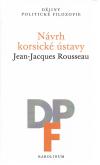
Jean-Jacques Rousseau. Návrh korsické ústavy (Constitutional Project for Corsica)
The first Czech translation of this Rousseau's writing is accompanied by an extensive introductory study that places it in the context of the author's life and work and the Corsican struggle for independence. It shows that the text has an important place within Rousseau's political works, as it develops in an interesting way the theses of his other political writings, not only Of the Social Contract. In doing so, it confirms the unity of Rousseau's view of political affairs, while also highlighting the importance he attached to practical politics.
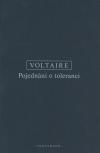
Voltaire. Pojednání o toleranci (Treatise on Tolerance)
The book contains a translation of Voltaire’s Treatise on Tolerance. The work was first published in 1763 and is now considered one of the key works of the French Enlightenment. In this book, Voltaire calls for tolerance between religions, denouncing religious fanaticism and superstition of his time (especially of the Jesuits).

Voltaire. Dva filosofické příběhy. Micromegas. Listy Amabedovy (Two Philosophical Stories. Micromegas. The Letters of Amabed)
This audiobook contains two novellas by Voltaire, a writer, poet and leading philosopher of the French Enlightenment. The philosophical novella Micromegas ranks among the first science fiction works ever written, while the Letters of Amabed is an epistolary critique of European civilization, colonialism, and the Church. Both satirical works are united by a view of their own society and culture from an external perspective. Voltaire’s works remain relevant more than 250 years after their composition and are accompanied by a conversation with an expert not only on the texts themselves but also on the wider context of the time.
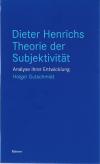
Dieter Henrichs Theorie der Subjektivität. Analyse Ihrer Entwicklung (Dieter Henrich's Theory of Subjectivity. Analysis of its Development)
Dieter Henrich (1927-2022) was one of the most influential philosophers of the German post-war period. At the center of his extensive work - even where it is not explicitly discussed - is the theory of self-consciousness and human subjectivity. Henrich has worked on questions related to this in a large number of texts for more than sixty years. However, due to the complexity and diversity of these texts, as well as to the fact that Henrich has hardly ever presented an overview of his theory, the connections have remained unclear to many readers. Gutschmidt analyzes the development of his position from its beginning. He deals with important influences on Henrich's teaching and addresses the central discussion of his positions.

Simone Weil. Basic Writings
The book brings together the major writings of one of the most thought-provoking and original thinkers of the 20th Century. Her works were chosen to show her exploration of the many facets of human destiny and cover politics, society, human obligations and rights, culture and morality, as well as science, school-studies and labour, all of which are a meditation on human condition, as well as mediation to the spiritual. The spiritual as our destiny is explored explicitly in essays on suffering and joy, on the various forms of love, on God and the Good as they are in and out of the world.
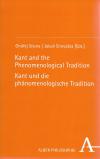
Kant and the Phenomenological Tradition. Kant und die phänomenologische Tradition
The common topic of the nine essays in this book is the phenomenological dialogue involving Kant and his ›invention of autonomy‹. Is there any relevance left to the Kantian notion of autonomy after the intensive development of ethical and phenomenological thought, stressing the importance of otherness, which, by definition, is beyond the control of any autonomy? What are the fruitful aspects of the Kantian idea that still deserve preservation and development? While the first three contributions are immanently Kantian, the majority focus on the relationship between Kant and selected authors of the phenomenological tradition: E. Husserl, M. Heidegger, E. Levinas, J. Patočka and B. Waldenfels.
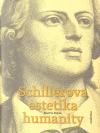
Schillerova estetika humanity [Schiller’s Aesthetics of Humanity]
Friedrich Schiller was the youngest of the so-called Weimar classics and one of the last great representatives of the German Enlightenment. His work, interrupted by an early death and endured under difficult living conditions, ranges from medicine to historiography or aesthetics to poetry, but its anchor and foundation is philosophical thinking. Not only as an author of theoretical writings, but especially as a dramatic poet, Schiller preached Enlightenment ideals and developed their systematic anchoring in dialogue with older rationalism as well as nascent idealism and romanticism. The presented book, following on from the author’s works on Herder and Goethe, tries to synthesize Schiller’s thinking across all areas of his work and to fill a noticeable gap in Czech knowledge of modern German culture, in which he tries to show precisely the link between philosophy, literature and social development.
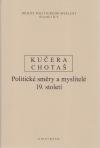
Dějiny politického myšlení. III/2, Politické směry a myslitelé 19. století
[History of Political Thought. III/2, Political Directions and Thinkers of the Nineteenth Century.]
In this second volume of the history of Modern political thought readers will find a philosophical and historical exposition of political thought from the American Revolution until the First World War. Special attention is paid to the emergence of the modern republic with democratic representation but also ideologies and thinkers (Tocqueville, Nietzsche, Weber) whose work was fully appreciated only in the twentieth century. Separate chapters then focus on the development of political thought in the nineteenth century in Russia and in the Czech Lands.
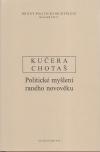
Politické myšlení raného novověku
(Early Modern Political Thought)
In this volume of the history of modern political thought, readers will find a philosophical and historical account of political thought from humanism and Renaissance until various movements in the French Enlightenment. Special attention is paid to the origins of theory of national states, Czech reformation, right to resistance, religious tolerance, natural and international law, and the theory of division of political power.




